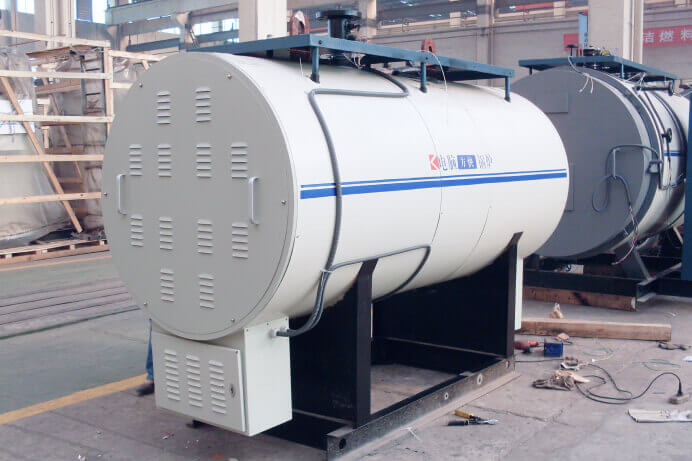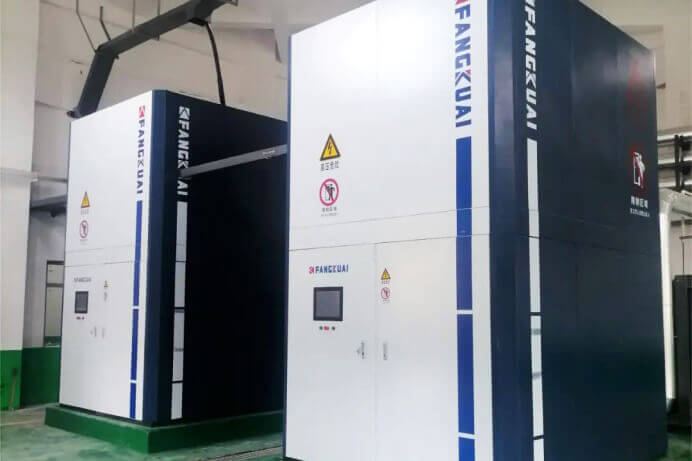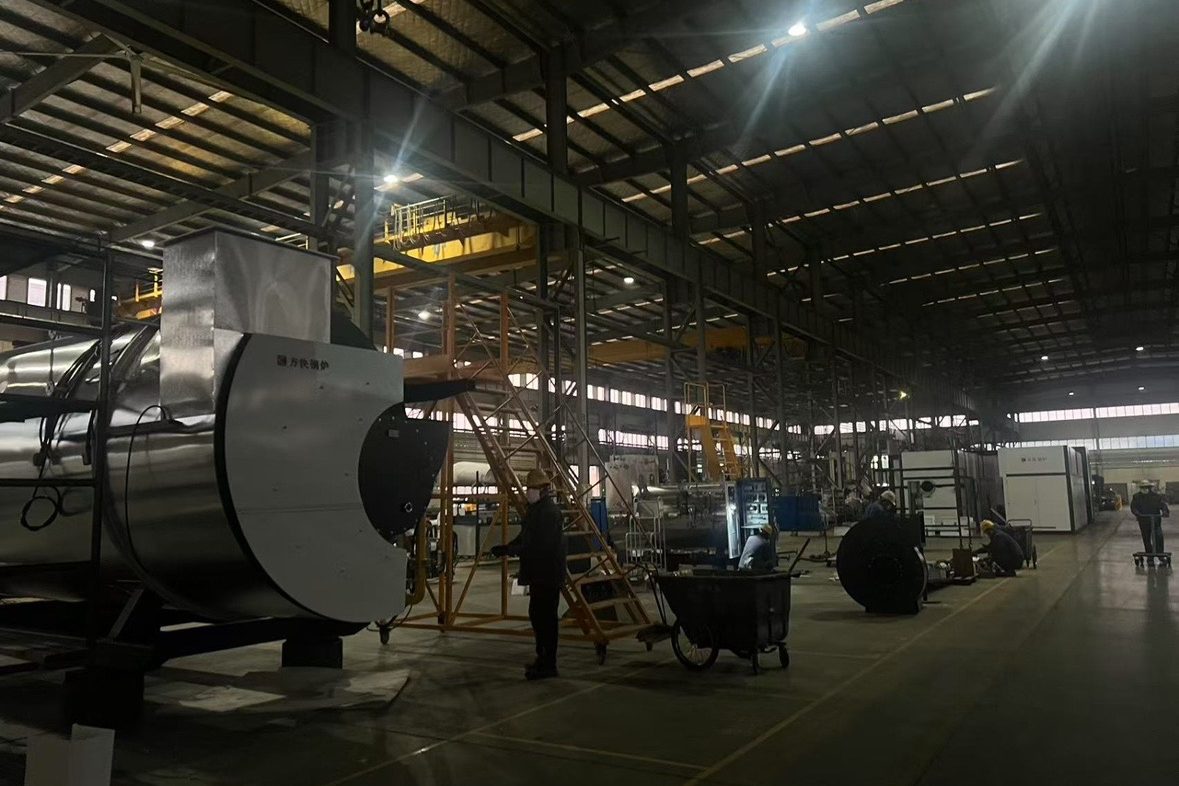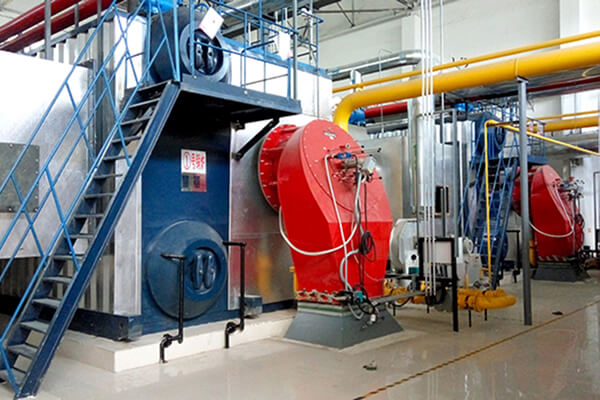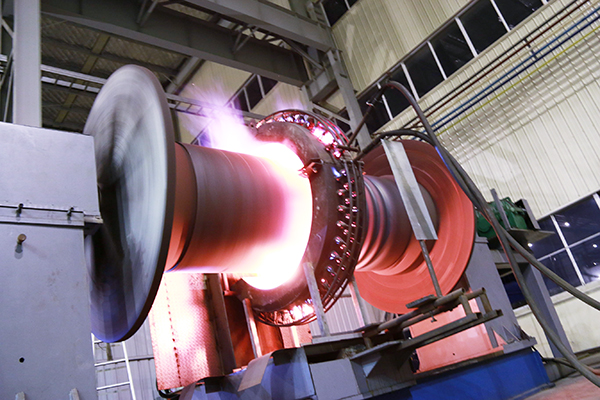In most areas, the operating cost of an electric steam boiler is about 3 times higher than that of a gas steam boiler, but the actual cost depends on your local energy costs.
1. Electric Steam Boiler
FangKuai Electric Steam Boiler Project Case
1.1 Common Types
There are two main types of electric steam boilers:
- Electric Resistance Boilers: Consists of heating elements that act as a resistor to the flow of electric current in order to convert the current into heat. Sized for small to medium industrial applications (food processing, medical sterilization), as well as commercial applications (Laundromats, car washes, etc.), larger capacity units tend to be used in larger scale industrial or commercial uses.
- Electrode Boilers: Utilize the conductivity of water in order to create steam by using DC current flow. Higher efficiency and capacity (up to 70 MW≈100t/h), suitable for large scale district heating and/or power grid balancing. Needs sophisticated water-treatment plants.
FangKuai Electrode Steam Boiler Project Case
1.2 Electric Steam Boiler Advantages
- Zero Emissions: No emissions at point of use. In a word,absolutely necessary inside strict environmental zones (pharmaceutical cleanrooms ).
- High Efficiency: ≥98% thermal efficiency (no economizer included).
- Compact & Safe: 40% smaller vs. gas boilers. No fuel storage/venting is required, thereby minimizing the risk of explosions.
- Precision Control: Accurate to within ±0.5°C.
- Low Maintenance: No moving parts and zero combustion elements.
1.3 Disadvantages
- High Operating Costs: Dominated by electricity prices. At standard rates ($0.14/kWh), costs triple those of gas boilers.
- Grid Dependency: Requires substantial power capacity (1,400 kW for 4-ton boiler).
- Scalability Limits: Single units rarely exceed 10 ton/h capacity. Slow cold-start (≥30 min).
1.4 Operating Cost Analysis (4-ton Boiler)
| Cost Component | Parameters | Cost (USD/hour) | % Share |
|---|---|---|---|
| Electricity | 2,800 kWh × $0.14/kWh | $392.00 | 95.7% |
| Water | 4.4 tons × $0.42/ton | $1.85 | 0.5% |
| Maintenance | $1,111/year | $0.13 | <0.1% |
| Labor | 1 operator ($6,000/month) | $2.78 | 0.7% |
| TOTAL HOURLY COST | $396.76 | 100% | |
| Annual Cost: $347,500 (8,760 hours operation) |
Fangkuai boiler production base – Contact Us
2. Gas Steam Boiler
2.1 Common Types
- WNS (Horizontal): Three-pass wet-back design. Capacity: 1-20 ton/h. Efficiency: 95-98%.
- SZS (Water-Tube): High-pressure/high-capacity (≤100 ton/h). Efficiency: 93-97%.
- Vertical/Fire-Tube: Space-saving (50% smaller footprint). Efficiency: ≤85%.
- Low-NOx Condensing: FGR/fully premixed burners + condensing heat recovery. Efficiency >100% (LHV). NOx ≤30mg/m³.
FangKuai WNS Condensing Steam Boiler
2.2 Advantages
- Lower Operating Costs: Gas energy costs ~1/3 of electricity per equivalent output.
- Rapid Response: Load adjustments in <3 minutes. 5:1 turndown ratio.
- High Scalability: Units available to 100+ ton/h.
- Energy Integration: Compatible with cogeneration (e.g., ORC turbines) for >85% total efficiency.
FangKuai NSZS Water tube steam boiler
2.3 Disadvantages
- Emissions Compliance: Annual CO₂ >2,500 tons for 4-ton boiler. Requires SCR/FGR systems in eco-zones (+30% capital cost).
- Safety Requirements: Gas leak detection, explosion-proof ventilation (≥6 air changes/hour), and emergency shutdowns per GB50028.
- Infrastructure Dependency: Pipeline access or LNG stations ($20,830+ investment) needed.
2.4 Operating Cost Analysis (4-ton Boiler)
| Cost Component | Parameters | Cost (USD/hour) | % Share |
|---|---|---|---|
| Natural Gas | 280 m³ × $0.42/m³ | $117.60 | 80.4% |
| Electricity | 17 kW × $0.14/kWh | $2.38 | 1.6% |
| Water | 4.4 tons × $0.42/ton | $1.85 | 1.3% |
| Labor | 0.25 operator ($6,000/month) | $0.69 | 0.5% |
| Maintenance | $1,111/year | $0.13 | <0.1% |
| Depreciation | $55,555 ÷ 15 years | $0.42 | 0.3% |
| Facility Allocation | $8,333/year | $0.48 | 0.3% |
| TOTAL HOURLY COST | $123.07 | 100% | |
| Annual Cost: $107,800 (8,760 hours) |
3. Comparative Summary & Selection Guidelines
3.1 Technical/Economic Comparison (4-ton Basis)
| Parameter | Electric Boiler | Gas Boiler | Gap |
|---|---|---|---|
| Hourly Operating Cost | $396.76 | $123.07 | +222% ↑ |
| Annual Operating Cost | $347,500 | $107,800 | +222% ↑ |
| NOx Emissions | 0 mg/m³ | 30-150 mg/m³ | -100% ↓ |
| Footprint | 161 ft² (15 m²) | 269 ft² (25 m²) | +40% ↑ |
| Startup Time | 10-25 min | 5-15 min | +70% ↑ |
| Typical Payback Period | N/A | <2 years vs. electric | — |
3.2 Selection Criteria
Priority Scenarios:
- Electric Boiler: Semiconductor plants, nuclear facilities (0.04/kWh).
- Gas Boiler: Food processing (>6,000 hours/year), pipeline gas zones ($0.35/m³).
- Hybrid System: “Gas base-load + electric peak-shaving” for regions with gas shortages.
Free cost calculation and solution
4. Conclusion
Gas boilers are economically superior where pipeline gas is available (<0.06/kWh), particularly for low-utilization loads (<1,500 hours/year).
Request Customized Analysis:
Provide:
- Local energy prices (electricity & gas tariffs)
- Daily steam consumption profile (tonnage + hourly demand)
- Environmental compliance limits (e.g., NOx ≤50 mg/m³)
Our engineers will deliver a complimentary feasibility report with lifecycle cost simulation. WhatsApp: +86 18269957295
Note: Costs based on global averages (Q2 2024). Actual project ROI requires localized LCOE (Levelized Cost of Energy) analysis.
Get your best price
Quickly compare 3 FREE quotes
- Engineer quick quote
- The overall delivery speed is fast
- Financial choice
- Low installation costs and cost savings
25 years+ of boiler R&D
More than 20 innovative technologies

